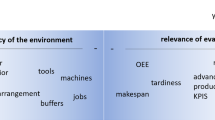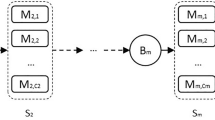Abstract
For maintenance of gas turbines (GTs) in oil and gas applications, capital parts are removed and replaced by parts of the same type taken from the warehouse. When the removed parts are found not broken, they are repaired at the workshop and returned to the warehouse, ready to be used in future maintenance. The management of this flow is of great importance for the profitability of a GT plant. In this paper, we adopt a previously developed formalized framework of the part flow and reinforcement learning (RL) to optimize part flow management. The formal framework and RL algorithm are extended to account for the stochastic failure process of the involved parts. An application to a scaled-down case study derived from an industrial application is illustrated.
Similar content being viewed by others
References
Yang K, He C, Huang Q, Huang ZY, Wang C, Wang Q, Liu YJ, Zhong B (2016) Very high cycle fatigue behaviors of a turbine engine blade alloy at various stress ratios. International Journal of Fatigue
Morini M, Pinelli M, Spina PR, Venturini M (2010) Influence of blade deterioration on compressor and turbine performance. J Eng Gas Turb Power 132:3
Boyce BL, Ritchie RO (2001) Effect of load ratio and maximum stress intensity on the fatigue threshold in Ti–6Al–4V. Eng Fract Mech 68(2):129–147
Bodrov AI, Stalder JP (1998) An analysis of axial compressor fouling and a blade cleaning method. J Turbomach 120:256–61
Kurz R, Brun K (2012) Fouling mechanisms in axial compressors. J Eng Gas Turb Power 134:3
Peters JO, Ritchie RO (2000) Influence of foreign-object damage on crack initiation and early crack growth during high-cycle fatigue of Ti–6Al–4V. Eng Fract Mech 67(3):193–207
Eliaz N, Shemesh G, Latanision RM (2002) Hot corrosion in gas turbine components. J Eng Gas Turb Power 9(1):31–43
Goward GW (1998) Progress in coatings for gas turbine airfoils. Surf Coat Technol 108:73–79
Compare M, Martini F, Mattafirri S, Carlevaro F, Zio E (2016) Semi-Markov model for the oxidation degradation mechanism in gas turbine nozzles. IEEE Trans Reliab 65(2):574–581
Ng I, Parry G, Wild P, McFarlane D, Tasker P (2011) Complex engineering service systems: concepts and research. Springer, London
Wang W (2010) A model for maintenance service contract design, negotiation and optimization. Eur J Oper Res 201:239–246
Murthy DNP, Asgharizadeh E (1999) Optimal decision making in a maintenance service operation. Eur J Oper Res 116:259–273
Godoy DR, Pascual R, Knights P (2014) A decision-making framework to integrate maintenance contract conditions with critical spares management. Reliab Eng Syst Safety 131:102–108
Jin T, Tian Z, Xie M (2015) A game-theoretical approach for optimizing maintenance, spares and service capacity in performance contracting. Int J Prod Econ 161:31–43
Jackson C, Pascual R, Knights P (2008) Optimal maintenance service contract negotiation with ageing equipment. Eur J Oper Res 189(2):387–398
Bollapragada S, Gupta A, Lawsirirat C (2007) Managing a portfolio of long term service agreements. Eur J Oper Res 182:1399–1411
Hu Q, Boylan JE, Chen H, Labib A (2018) in spare parts management: a review. Eur J Oper Res 266:395–414
Sutton R, Barto A (1998) Introduction to reinforcement learning, vol 135. MIT Press, Cambridge
Lieckens KT, Colen PJ, Lambrecht MR (2015) Network and contract optimization for maintenance services with remanufacturing. Comput Oper Res 54:232–244
Kurz J (2016) Capacity planning for a maintenance service provider with advanced information. Eur J Oper Res 251:466–477
Olde Keizer MCA, Teunter RH, Veldman J (2017) Joint condition-based maintenance and inventory optimization for systems with multiple components. Eur J Oper Res 257:209–222
Van Horenbeek A, Buré J, Cattrysse D, Pintelon L, Vansteenwegen P (2013) Joint maintenance and inventory optimization systems: a review. Int J Prod Econ 143:499–508
Jaturonnatee J, Murthy DNP, Boondiskulchok R (2006) Optimal preventive maintenance of leased equipment with corrective minimal repairs. Eur J Oper Res 174:201–215
Zanjani MK, Nourelfath M (2014) Integrated spare parts logistics and operations planning for maintenance service providers. Int J Prod Econ 158:44–53
Compare M, Bellani L, Cobelli E, Zio E, Annunziata F, Sepe M, Carlevaro F A Reinforcement Learning approach to optimal part flow management for gas turbine maintenance, submitted for publication to European Journal of Operational Research
Kaelbling LP, Littman ML, Moore AW (1996) Reinforcement learning: a survey. J Artif Intell Res 4:237–285
Szepesvári Cs (2010) Algorithms for reinforcement learning. Morgan and Claypool
Kuznetsova E, Li YF, Ruiz C, Zio E, Ault G, Bell K (2013) Reinforcement learning for microgrid energy management. Energy Elsevier 59:133–146
Rahimiyan M, Mashhadi HR (2010) An adaptive Q-learning algorithm developed for agent-based computational modeling of electricity market. IEEE Trans Syst Man Cybrn Part C, Appl Rev 40(5):547
Barde S, Yacout S, Shin H (2016) Optimal preventive maintenance policy based on reinforcement learning of a fleet of military trucks. J Intell Manuf, 1–15
Aissani N, Beldjilali B, Trentesaux D (2009) Dynamic scheduling of maintenance tasks in the petroleum industry: a reinforcement approach. Eng Appl Artif Intell 22(7):1089–1103
Pontrandolfo P, Gosavi A, Okogbaa OG, Das T (2002) Global supply chain management: a reinforcement learning approach. Int J Prod Res 40(6):1299–1317
Giannoccaro I, Pontrandolfo P (2002) Inventory management in supply chains: a reinforcement learning approach. Int J Prod Econ 78(2):153–161
Kim CO, Jun J, Baek JK, Smith RL, Kim YD (2005) Adaptive inventory control models for supply chain management. Int J Adv Manuf Technol 26(9–10):1184–1192
Ehleiter A, Jaehn F (2016) Housekeeping: foresightful container repositioning. Int J Prod Econ 179:203–211
Kim KH, Lee KM, Hwang H (2003) Receiving operations for yard cranes in port container terminals sequencing delivery. Int J Prod Econ 84:283–292
Zio E (2007) An introduction to the basics of reliability and risk analysis, vol 13. World Scientific
Wang YH, Li TH, Lin CJ (2013) Backward Q-learning: the combination of Sarsa algorithm and Q-learning. Eng Appl Artif Intel 26:2184–2193
Author information
Authors and Affiliations
Corresponding author
Additional information
Publisher’s Note
Springer Nature remains neutral with regard to jurisdictional claims in published maps and institutional affiliations.
Rights and permissions
About this article
Cite this article
Compare, M., Bellani, L., Cobelli, E. et al. Reinforcement learning-based flow management of gas turbine parts under stochastic failures. Int J Adv Manuf Technol 99, 2981–2992 (2018). https://doi.org/10.1007/s00170-018-2690-6
Received:
Accepted:
Published:
Issue Date:
DOI: https://doi.org/10.1007/s00170-018-2690-6




